 "QUANTUM SHOT" #439
"QUANTUM SHOT" #439link
From High Fantasy to Hard Science Fiction:
A Spectrum of Wonder
The award-winning science fiction of Nancy Kress is well-known to avid readers worldwide. She entered the field with intense, imaginative fantasy stories in the late 1970s, and since then made a transition into "hard" science fiction - novels with fully developed scientific ideas and engaging characters. Check her site for the frequent updates.
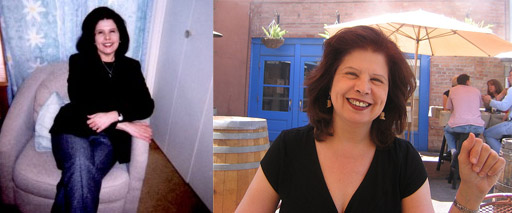
(image credit: Ellen Datlow)
We contacted Nancy about her recent work - trying to stay away from the obvious questions, like "Where do you get your ideas?" (Harlan Ellison used to answer this with: "Schenectady", which is a town in upstate New York) or about role of women in American science fiction (read her excellent speech about that here).
However, her mysterious shift from writing fantasy to hard science fiction thrillers caught our interest... not to mention the shining and warm character of her prose.

(art by Kinuko Y. Craft)
DRB: Thank you for appearing on Dark Roasted Blend... Can you give a brief introduction to your writing for DRB readers?
I've published twenty-five books, including four short story collections, three books about writing, three biothrillers, and fifteen novels. My first story came out in 1976, and since then my short fiction has won four Nebulas, a Hugo, and the Sturgeon. I write often about genetic engineering. I live in Rochester, NY with the world's most spoiled toy poodle.
DRB: You write both hard science fiction (though with a strong human element) and fantasy. Any preference between the two?
I started out writing fantasy (my first three novels) but then switched to science fiction. I don't really know why this happened -- very little about my career has been planned. As time went on, my "soft SF" turned to medium-viscosity, then actually hardened. What interests me now about hard SF is that this is the future we will be living in, and not that long ahead, either. For some reason, knowing that enables me to create characters that feel more real than those I created for fantasy. None of this is logical.
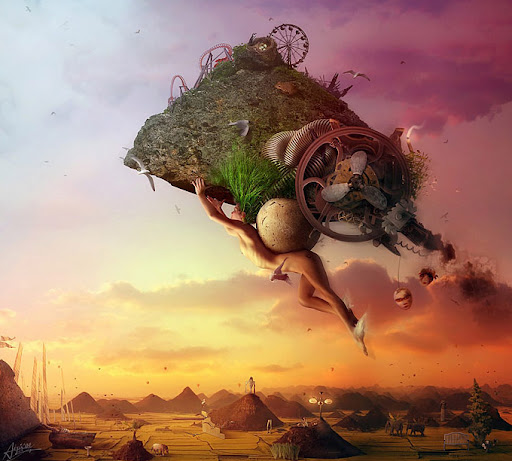
(art by: Mario Sanchez Nevado)
DRB: Do you find it hard to have both an artistic and scientific mindset in this demanding world?
I don't actually have a scientific mindset -- I wish I did. I have no scientific training, and I don't think I'd be very good at the repetitive detail that doing science demands. Fortunately, actual scientists have been wonderful at answering my questions. I collect micro-biologists the way other people collect butterflies.

(art by: Christoph Vacher)
DRB: Many of your novels center on genetic engineering. Why this focus? What are the other aspects of our progress that concern you the most, cause you to be passionate about?
Genetic engineering intrigues me so much because it's the most intimate of the sciences, impacting our bodies and brains and those of our children. Whereas quasars, say, are happening millions of light years away. The other "aspect of our progress" -- or lack of it -- that concerns me most is managing the planetary environment, including food crops.

(original unknown)
DRB: Favorite writers? Do you consider yourself to be of Theodore Sturgeon school when it comes to human relationship in stories? (i. e. deep, lyrical and optimistic vs. cynical and harsh)
Sturgeon is one of my favorites, as is Ursula LeGuin. I don't know if I'm lyrical (or) cynical about human relationships. Probably both. As a species, we're capable of both heroism and brutality, sacrifice and selfishness. Even a single individual is capable of all those things, depending on circumstance. I strive for that ambiguity in my writing.

(art by: Christoph Vacher)
DRB: Who (or what) were your first influences in writing: persons, fiction, movies, art?
Like most writers, as a child I read everything I could: books, comics, the backs of cereal boxes, the confession magazines my mother hid under the towels in the linen closet. Probably it all influenced me in some ways, dropping into the well of unconscious. As a kid I didn't see too many movies, except on TV; we had very little extra money for movies.
DRB: Did you get any help in getting published? Do you consider the 70s and 80s as a better market for short fiction?
I had no help selling my initial stories, since I didn't know help existed. I'd never heard of fandom, conventions, SFWA, or LOCUS. I put stories in envelopes the way "Writer's Market" said you should, mailed them out, and remailed them after they came back. I'd sold three stories before I found out there was an actual SF community. Certainly in the '70's and '80's there were more magazines publishing SF, yes. I also think the bar must have been set lower, or my earliest published stories would never have been bought.
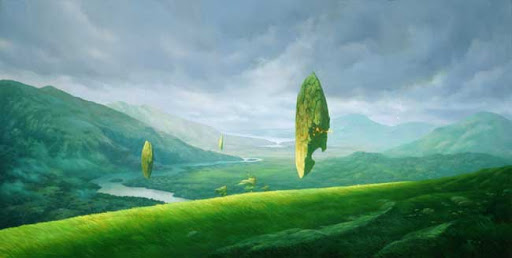
(art by: Christoph Vacher)
DRB: More books are published today, of a bigger variety. Yet, less and less people are reading books, or even have time to read them. Did you have to adapt to these realities?
The publishers have had to adapt. My only adaptation has been less income, which is regrettable, but in no way changed what or how I write.
DRB: Do you see internet as an empowering or stilting creative force? (it's easier to get published for aspiring writers, but it's easier to stay mediocre, too)
I see the Internet as the beginning of huge changes in the way stories are distributed, but only the beginning. So far, nobody has figured out a way to make real money by putting fiction up on the Net (Sci-Fi.com lost money on fiction, Jim Baen's Universe is struggling). When they do, the picture will change, especially if e-readers like the Kindle really catch on.

(art by Kinuko Y. Craft)
DRB: Do you consider yourself ambitious? What drives you to keep writing? Any particular advice to writers entering the field?
I write because, after thirty years, I can't not write. It's like breathing, a thing I do more or less on schedule. If that's ambition, then I've got it. If trying to do the best writing I can is ambition, then I've got that, too.
For new writers: The best advice is still WRITE. Often, steadily, and a lot. There is no substitute for practice.

(art by: Christoph Vacher)
DRB: Do you have a favorite among your stories? the one you enjoyed the most writing?
I most enjoyed writing STINGER, a bio-thriller novel about a strain of genetically engineered malaria, and "Fountain of Age," a short story in which I got in touch with my inner criminal.
DRB: Your new novel is "Dogs". Please tell us a bit more about its message. Is it a thriller? Horror? Shirley Jackson-like soft horror?
DOGS is a bio-thriller. An epidemic has started among the dogs of a small town on the Maryland-West Virginia border. The virus seems to turn even beloved pet dogs vicious. The governmental response to this is to quarantine the town and start rounding up all its dogs, even those showing no symptoms. It's one thing to destroy a billion avian-flu chickens in Asia; it's quite another to ask Americans to surrender their pets, and many folks in that part of the country are armed. In addition, an ex-FBI agent (female) lives in town, and she suspects that more is going on here than is at first apparent. She's right. The book moves from Maryland to London to Africa.
DOGS is coming out from Tachyon Press in July 2008.
Other recent and upcoming books by Nancy Kress include:
NANO COMES TO CLIFFORD FALLS AND OTHER STORIES, Golden Gryphon Press, May, 2008
STEAL ACROSS THE SKY, an SF novel, Tor, December 2008
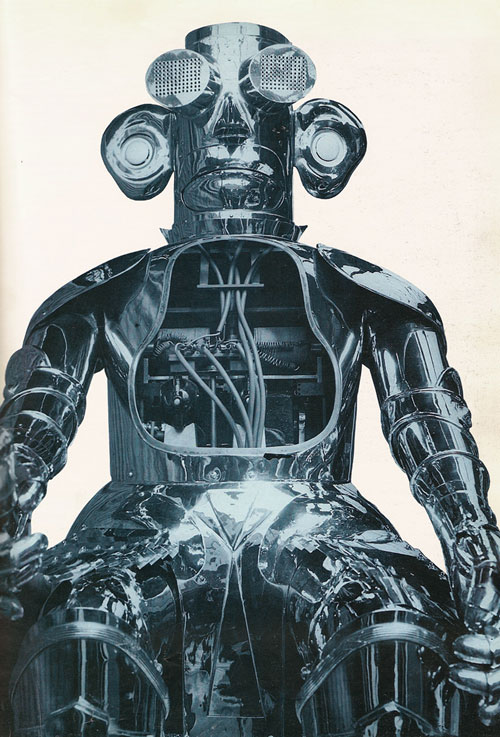
(Alpha the Robot, 1932 - via)
DRB: Do you have any pets? What are the joys in your life that you can't live without?
I have a dog, a tiny poodle named Cosette, whom I put in the book. Joys in life? Reading, friends, movies (making up for my childhood), my kids, chess, chocolate.
DRB: Tell us three facts in this world that endlessly fascinate you, every time you think about them
1) I am actually alive, breathing and thinking and moving.
2) One day I will not be alive.
3) Maybe something happens after that, maybe not. (okay, not a fact, but endlessly fascinating)
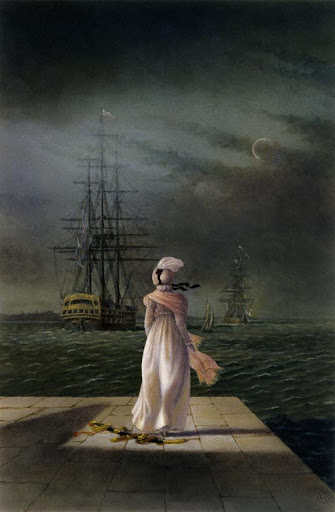
(art by Kinuko Y. Craft)
Read another revealing interview with Nancy Kress here. The following is a cool photograph (not Nancy Kress... maybe Leigh Brackett, or Catherine L. Moore? Or just a girl I've seen recently in a coffee shop - complete with a portable typewriter.)

Artwork on this page courtesy Christoph Vacher and Kinuko Y. Craft
Read other DRB exclusive interviews with:
- Jeff VanderMeer
- John C. Wright
- Kris Kuksi
Permanent Link...
 ...+Facebook
...+Facebook Category: Books,Art
Dark Roasted Blend's Photography Gear Picks:









0 comments:
Post a Comment